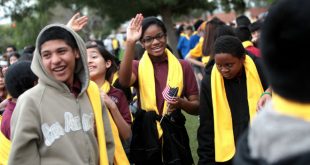A federal court ruled in 2019 that the University of Iowa violated the U.S. Constitution when it deregistered a student group called Business Leaders in Christ for requiring its leaders to abide by Christian beliefs, including what the Bible teaches about sexual morality — that homosexuality, fornication, and adultery are sins.
Other student groups on campus require their leaders to share the organization’s values, but anyone can become a member. This wasn’t good enough for the homosexual student who complained. Ruling in favor of the group, Judge Stephanie Rose said the school applied the “non-discrimination” policy unevenly, allowing other groups with restrictions to remain.
But that wasn’t the end of it for student groups at the University of Iowa. The school also deregistered InterVarsity Christian Fellowship/USA for a similar reason. Leaders have to agree with the organization’s statement of faith, although regular members do not. In fact, the school had purged close to 40 groups — including religious groups — from campus because leaders had to meet certain criteria.
In 2019, the same federal court ruled in Intervarsity’s favor. In her ruling, Judge Rose said she didn’t understand why the school deregistered InterVarsity after she ruled in favor of Business Leaders In Christ.
Now there’s more good news for Intervarsity. Becket Law has announced a victory for the group in the U.S. Court of Appeals for the Eighth Circuit. From the opinion (PDF).
After the district court ordered it to stop selectively enforcing the policy against one religious group, the University deregistered another—InterVarsity Graduate Christian Fellowship. InterVarsity filed suit. On cross-motions for summary judgment, the district court held that University employees violated InterVarsity’s First Amendment rights and denied qualified immunity. We affirm. (emphasis added)
The Eighth Circuit contended that it was “hard-pressed to find a clearer example of viewpoint discrimination.” The University of Iowa selectively applied the Human Rights Policy against Intervarsity and “focused its ‘clean up’ on specific religious groups and then selectively applied the Human Rights Policy against them. Other groups were simply glossed over or ignored.”
Becket Law represents Intervarsity.
“Schools are supposed to be a place of free inquiry and open thought, but the school officials here punished opinions they didn’t like and promoted ones they did—all while using taxpayer dollars to do it,” senior counsel Daniel Blomberg said. “The good news is that they’ve been held accountable, and school officials nationwide are on notice. We are optimistic that in the future, colleges will pursue policies of accommodation, not discrimination, when it comes to religious exercise on campus.”
Photo credit: By Vkulikov – Own work, CC BY-SA 3.0, Link
 CURE News and Clergy Blog News and Commentary for Christians
CURE News and Clergy Blog News and Commentary for Christians



